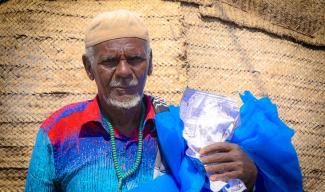Malaria is found in nearly 70 percent of the Ethiopia, with 52 percent Ethiopians at risk of infection, and transmission is highly seasonal and varies geographically across the country. Widespread malaria epidemics have been largely absent in the country since 2004 after the successful scale-up of malaria control interventions.
Through the concerted efforts of the U.S. President’s Malaria Initiative (PMI), USAID partners with Ethiopia’s National Malaria Elimination Program to improve malaria prevention and treatment activities with an aim to substantially decrease malaria morbidity, towards the long-term goal of elimination. Ethiopia is shrinking the malaria map by targeting and expanding malaria elimination woredas (districts) through surveillance and timely response.
In 2007, PMI made Ethiopia one of the focus countries in Africa. Since then, the United States has invested over $445 million to combat malaria in Ethiopia. This has contributed to improved prevention methods, including distribution of over 40 million long-lasting insecticide-treated bed nets, as well as enhanced diagnostic and treatment capacity that has helped Ethiopia cut malaria incidence and deaths by more than half between 2015-2018.
All malaria activities under PMI are planned and implemented in close collaboration with the Ministry of Health and relevant regional health bureaus to reach its health development goal of 100 percent coverage of at-risk populations with proven preventive and therapeutic interventions. These include coverage with long-lasting insecticide-treated nets or indoor residual spraying for mosquito control, 100 percent access to diagnosis with rapid diagnostic tests or microscopy for all malaria suspects, treatment with effective malaria medications, and malaria-focused social behavioral change communications and other health systems strengthening activities.
In addition, PMI collaborates with the Government of Ethiopia’s Pharmaceutical Supply Agency to ensure availability of antimalarial drugs, insecticide treated mosquito nets, and other medical supplies to improve malaria prevention, care and treatment across the country.
KEY ACTIVITIES
- The Indoor Residual Spraying for Malaria Control project implements best practices on environmentally compliant indoor residual spraying operations to reduce malaria transmission in selected districts in malaria-prone regions. It surveils and monitors the biological and physiological impact of indoor residual spraying on mosquitoes, and the mosquitoes susceptibility to the insecticides to inform decision-making on malaria control.
- Global Health Supply Chain Program–Procurement and Supply Management (GHSC-PSM) Task Order 2 (TO2) procures and distributes insecticide-treated mosquito nets, antimalarial drugs, and rapid diagnostic tests to health facilities and households nationally.
- The Malaria Diagnosis and Treatment Activity strengthens malaria laboratory diagnosis and treatment by providing case management supervision and mentorship at health facilities and communities in Tigray, Amhara, Afar, Oromia, Benishangul Gumuz and Gambella regions. It also assesses regularly the therapeutic efficacy of antimalarial drugs.
- The Monitoring and Evaluation Activities for Malaria Prevention and Control in Ethiopia project coordinates monitoring and evaluation and malaria surveillance activities, and assists with revising the national malaria strategy; improving malaria data quality, collection and compilation; and conducting analysis to guide decision-making.
KEY RESOURCES
- Fact Sheet: Malaria Program Overview [PDF 365 KB]
- Fact Sheet: PMI Activities in Ethiopia [PDF 500kb]
- Video: Camels Fight Malaria in Ethiopia [1:52]

